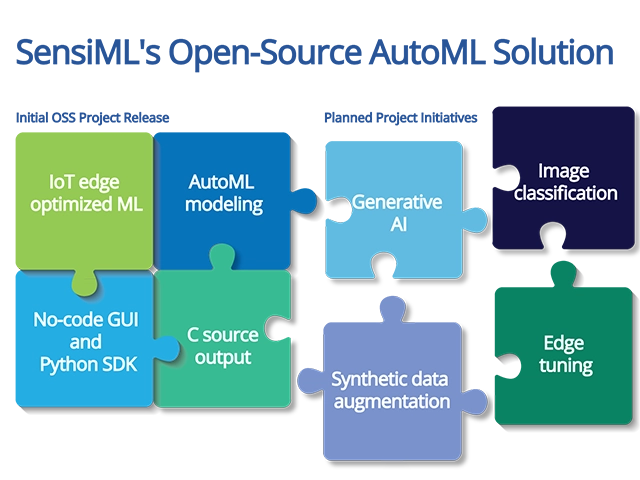Integrate ML Insight into Your IoT Endpoint Quickly and Easily

Ultra-Compact Edge ML Code
Generating models as small as 5KB with built-in profiling estimator to show RAM, Flash, and Stack memory as well as model latency

No-Code GUI or Python SDK
Choose your preferred interface and switch freely between point-and-click and programmatic pipeline workflows.

AutoML Model Generation
Automated model generation with optional fine-grained user control allows productive ML development for data scientists and AI novices alike.

C Source Code Output
No RTOS or external code dependencies. Model outputs are self-contained, highly portable model libraries with multiple levels of inference interfacing to your code.
Hardware agnostic
Hardware-agnostic solution supports a broad array of edge processors and silicon vendors
Foundation for innovation
Establishes a foundation for community-driven edge ML innovation including generative AI, synthetic data generation, and edge learning
Create accurate sensor inference code for IoT device applications
Until now, IoT device developers undertaking what are often their first AI/ML projects have had to wade through a fragmented market of proprietary tools with varying capabilities and unclear roadmaps. The open-source release of SensiML’s Analytics Studio marks a significant milestone for the IoT Edge AI software tools industry providing:
Platform Agnostic Model Generation
SensiML’s plug-in style, open-source architecture supports a broad array of MCUs, AI/ML accelerated SoCs, and AI engines inspiring developer confidence to build ML datasets using flexible tools not tied to specific vendors, chipsets, or inference engines.
Time-Series Sensor Inputs
Provides support for all conceivable time-series sensors such as microphones, accelerometers, gyros, IMUs, loadcells, strain gauges, PIR sensors, and more. Inputs can be mixed for more complex models with sensor fusion algorithms.
Rapid Innovation
AI/ML’s fast evolution demands an open-source approach to harness the broader developer community expertise, accelerating key innovations such as generative AI, synthetic data, and edge learning advancements.
Flexibility
Analytics Studio supports multiple model development mechanisms from point-and-click AutoML powered model generation, to code-free UI modeling with full pipeline control, to entirely programmatic Python SDK model creation.
Extensibility
Analytics Studio provides model generation for basic feature-based models, regression models, classic ML, and deep learning neural networks. Its rich library of over 80 feature generators also includes the ability to easily add custom transforms, filters, features, and classifiers making it easy for community developers to enhance.

Our time-tested code base now available to the broader development community
SensiML seeks to extend Model Creator to include:
- Generative AI model development and tuning
- Synthetic dataset augmentation
- Local LLM support
- Object recognition from image and video data streams
- Enhanced edge model tuning and learning
- More MCU, MPU, NPU, and GPU integrations / optimizations
- More pre-trained model templates for real-world use cases
New and existing users will have the flexibility to choose between SensiML’s open-source version of Analytics Studio or its fully managed and supported SaaS cloud service implementation based on the same core technology.
Get Started Using Piccolo AI Today
Piccolo AI runs as a web application served from a Linux server endpoint running locally on your own system. Piccolo can therefore be run on a Linux system or Windows desktop PC.
You can get started building intelligent sensor algorithms for edge IoT devices in as little as 20 minutes using our convenient step-by-step installation video.
Community Resources
SensiML is building an open source community, with contributors from around the globe building features, documentation and assisting other users.
Ready to join our community?
SensiML will launch its public GitHub repository and AutoML engine documentation early this summer. Developers interested in receiving updates and becoming contributors to this pioneering technology can sign up below